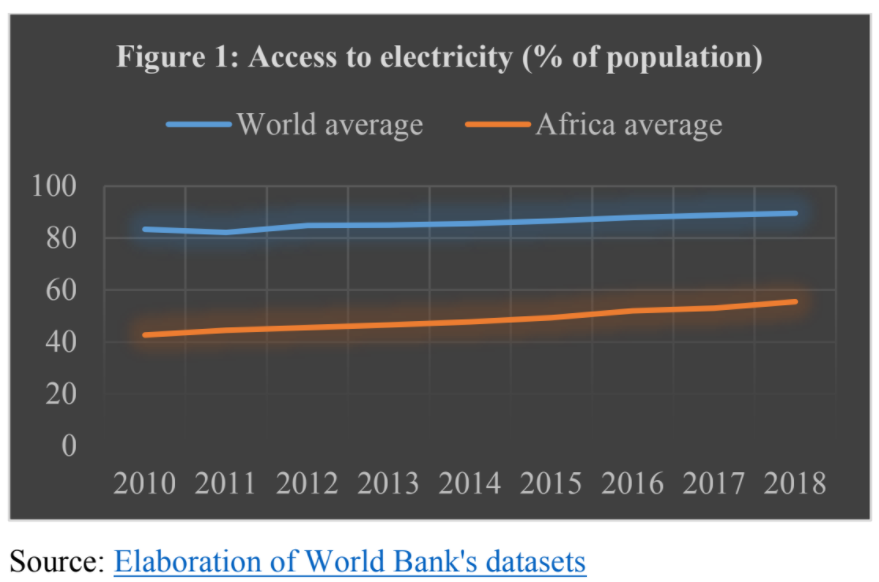Adedeji Adeniran
Chukwuka Onyekwena
Sone Osakwe
CSEA AFRICA – CENTRE FOR THE STUDY OF THE ECONOMIES OF AFRICA
March 2021
Affordable and efficient energy supply is essential for enhanced welfare and better development outcomes. However, African states suffer from huge deficits in energy generation and distribution, resulting in unreliable power networks, frequent power outages and expensive tariffs. In a bid to improve efficiencies through interconnectivity and reduce energy development challenges at the national level, sub-regional power pooling initiatives have become increasingly popular in Africa. The idea behind creating power pools is to encourage cooperation among countries, through linking excess capacity in one country where power is produced more economically, with excess demand in another country that can benefit from cheaper imports.
Although the power pooling initiative has had some relative success, it has not yielded as much growth in Africa’s energy sector as anticipated. This indicates a need to adopt strategies that can build on the positives from power pooling, and resolve some of the associated limitations. One of such strategies could be to explore ways in which regional integration, as embodied in the recently adopted African Continental Free Trade Agreement (AfCFTA), could strengthen the energy sector and existing power pools, and support better utilisation of the region’s abundant renewable energy resources to meet unmet demand.
Current energy deficit and shortcomings of existing power pools
The proportion of Africans with access to electricity is significantly lower than the global average as shown in figure 1. A far more disturbing trend is the uneven access across the region. For instance, only about 1% of South Sudan’s population have access to electricity, whereas, most of North Africa has a 100% access rate. This disparity is influenced by several factors including quality and effectiveness of energy policies, production capacity, and ability of countries to leverage international resources. One major reason for the dismal level of energy access in Africa is inadequate production to meet the high-energy demands. In 2018, total energy produced in the region accounted for less than 6% of global supply; meanwhile, Africa makes up over 16% of world population. Energy shortages have forced households and businesses to rely on expensive generators as alternatives, thereby impairing standard of living and productive economic activities.
Currently, there are existing power pools covering North Africa, Southern Africa, East Africa, West Africa and Central Africa, with a combined installed capacity of only 33.8 gigawatts. Overall, power pooling has not reached its full potential in solving Africa’s energy problems. This is due to weak infrastructure and network grids, and several other factors including:
∙ Insufficient pooling of investments: An annual investment of approximately $120 billion is required to boost energy capacity in Africa. Due to budgetary constraints, member states of these sub-regional pools have not been able to mobilise sufficient funds to finance infrastructure projects. Private sector capital has also not been fully harnessed because of delay in trade liberalisation policies and unconducive business environment that create investment risks.
∙ Poor regulatory and institutional space: Africa’s existing power pools are not supported by well-defined, consistent and predictable energy policies and institutions. Regulatory focus is often targeted at short-term goals rather than long-term development. Also, regional energy institutions are not sufficiently empowered and lack the right structures to effectively harmonise and implement/enforce development strategies or reforms. Lack of a strong regulatory and institutional framework has brought about uncertainty, which is a barrier to investment and growth of the sector.
∙ Mistrust among member states: Member states have shown a great deal of reluctance in supporting the existing power pools because of the fear of losing national sovereignty. This is due to the possibility of dominant energy-exporting countries exerting undue influence over other states, through regional policies. Misaligned individual country interests and lack of operational transparency have also contributed to such fears. In addition, countries are not guaranteed that other members would honour the terms of trading agreements.
∙ Political economy issues: Government-owned enterprises are often major energy providers in several member countries, supplying power at subsidised rates because of inefficient and high production costs. Such arrangements make the energy market rather complex, and deter private-sector involvement. It also influences the political will to adopt and align with regional power reforms. Also, the fragile political climate in some member countries has weakened the effectiveness of the power pools as a result of uncertainty.
Prospects of AfCFTA in stimulating integration of Africa’s energy systems
Encouraging a single regional energy market under the AfCFTA could potentially mitigate some of these shortcomings, and improve the prospects of regional power pooling. More so, the AfCFTA specifically lists the energy sector as a priority area for trade liberalisation, which could potentially induce benefits such as:
∙ Investment opportunities: The AfCFTA provides an expansive energy market that allows free trade, which will attract private sector investors and development finance institutions. Such additional investments could encourage funding technologies to reduce cost of production, increase capacity and maximize energy generation, which in turn can improve access to diverse energy products. Increased trade can also act as catalyst for innovative finance options and schemes, strengthen financial systems to be able to support energy development projects, and incentivise investment in physical energy infrastructure by reducing investment risks.
∙ Coordinated policy approach and implementation: The governance framework of the AfCFTA is quite elaborate, and member countries are bound by certain rules to align local laws with broad regional plans. A single market provides an avenue for unified interventions and better coordination of reform agenda that could promote several initiatives, including a more sustainable and environmentally friendly energy route for growth. Increased regional interaction and collaboration would encourage synergy among energy stakeholders and allow for sharing of best practices and resources. Meanwhile, trade competition could spur member states to adopt better national policies to improve efficiencies and returns from the energy sector. Moreover, since the economic growth plan for the AfCFTA also covers other development goals that are interconnected, it would offer a more holistic approach in driving energy development.
∙ Engendering trust among member states: Under the AfCFTA, there is a mandatory obligation for members to publish trade-related regulations and procedures, to provide greater transparency. There is also provision for a dispute resolution framework. These would help ease the fears of smaller economies.
Although it is unrealistic to think that Africa’s energy problems would disappear once the AfCFTA takes off, effective regional collaboration can help to boost energy production and support a more efficient distribution mechanism. It is imperative that the lessons from existing sub-regional energy collaborations are incorporated into future reforms and improved upon. Physical infrastructure such as national grid development is crucial for a successful regional power integration; therefore, national governments need to play their role in upgrading outdated grids. An inclusive and transparent regional governance framework should also be prioritised, to ensure that the interests of energy stakeholders are adequately aligned.
Note: Adapted from our recent policy brief: Adeniran, A. P., & Onyekwena, C. (2020). Accelerating Green Energy Transition in Africa Through Regional Integration.
Source: CSEA AFRICA – CENTRE FOR THE STUDY OF THE ECONOMIES OF AFRICA http://cseaafrica.org/improving-energy-efficiency-and-interconnectivity-in-africa-through-regional-economic-integration/


